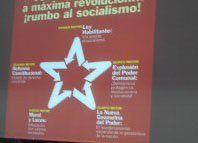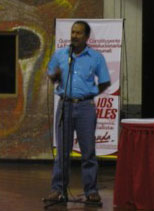 The workers in Inveval
are pioneers. Not only have they succeeded after a long and arduous struggle to
achieve the nationalisation under workers' control of their factory on the
beautiful heights of the Cordillera along the Caribbean Sea, not only have they
proven that workers are capable of managing a factory themselves, breaking the
old hierarchy and capitalist division of labour on the shop floor, but they are
also pioneers in integrating different misiones in their "productive
work". Many of the leaders of the factory are also actively involved in the new
military reserve, participating in the UNEFA, the university of the Armed
Forces where they are trained in military matters. Above this they have been
proposed by the Ministry of Light Economy and Trade (Milco) to play a leading
role in the political training sessions on socialism in the other public
industrial companies. This is part of the five revolutionary engines Moral y
Luces (Moral and Lights) proposed by president Hugo Chavez at the beginning
of the year. This "motor" is aimed at organising debates and political training
on socialism two or three hours a week during working hours throughout the
country.
The workers in Inveval
are pioneers. Not only have they succeeded after a long and arduous struggle to
achieve the nationalisation under workers' control of their factory on the
beautiful heights of the Cordillera along the Caribbean Sea, not only have they
proven that workers are capable of managing a factory themselves, breaking the
old hierarchy and capitalist division of labour on the shop floor, but they are
also pioneers in integrating different misiones in their "productive
work". Many of the leaders of the factory are also actively involved in the new
military reserve, participating in the UNEFA, the university of the Armed
Forces where they are trained in military matters. Above this they have been
proposed by the Ministry of Light Economy and Trade (Milco) to play a leading
role in the political training sessions on socialism in the other public
industrial companies. This is part of the five revolutionary engines Moral y
Luces (Moral and Lights) proposed by president Hugo Chavez at the beginning
of the year. This "motor" is aimed at organising debates and political training
on socialism two or three hours a week during working hours throughout the
country.
 Again, the workers of
Inveval have broken new ground. Two weeks ago they took the initiative to meet
the communal councils of their community. Through their elected factory
council, which takes charge of the daily running of the factory, they invited
representatives of the communal councils for a meeting. Communal councils are
also democratically elected bodies based in the local community - groups of 200
to 400 families in urban areas - whose aim is to establish an inventory of the
local infrastructure needs, etc. If approved by the state, the necessary money
will be designed to do the work under the control of the communal councils.
These councils, 16,000 have already been established in Venezuela, tend
to clash with the existing local capitalist state structures which still
prevail. The aim is to establish some 30,000 communal councils covering the
whole of the national territory. Even if
those old state structures are formerly controlled by Chavista leaders, mayors,
governors or councillors they have not fundamentally changed in nature. They
are corrupt, opaque, undemocratic, bureaucratic, riddled with nepotism and
respond to the interests of capitalism more than to the needs of the poor
masses.
Again, the workers of
Inveval have broken new ground. Two weeks ago they took the initiative to meet
the communal councils of their community. Through their elected factory
council, which takes charge of the daily running of the factory, they invited
representatives of the communal councils for a meeting. Communal councils are
also democratically elected bodies based in the local community - groups of 200
to 400 families in urban areas - whose aim is to establish an inventory of the
local infrastructure needs, etc. If approved by the state, the necessary money
will be designed to do the work under the control of the communal councils.
These councils, 16,000 have already been established in Venezuela, tend
to clash with the existing local capitalist state structures which still
prevail. The aim is to establish some 30,000 communal councils covering the
whole of the national territory. Even if
those old state structures are formerly controlled by Chavista leaders, mayors,
governors or councillors they have not fundamentally changed in nature. They
are corrupt, opaque, undemocratic, bureaucratic, riddled with nepotism and
respond to the interests of capitalism more than to the needs of the poor
masses.
Jorge Rodriguez, Venezuelan Vice-president, declared recently that "The people nowadays are not the same. The people need to be organised. We don't have to wait for the mayors, the governors, the ministers to tell us what to do. Quite the contrary, the people have to tell them what to do." It is no accident that Hugo Chavez has called for an "explosion of communal power", as he is very well aware of the persistence of the bourgeois state apparatus, which he has called to be dismantled. The communal councils can therefore become the basis of a new revolutionary and democratic state structure directly controlled by the masses. If they join with the factory councils, such as have been established at Inveval or Sanitarios Maracay, they could develop into a modern and Venezuelean version of the "Soviet" democracy typical of the early years of the Russian revolution.
Nevertheless this is not an automatic thing. Journalists at the new public television Vive TV, who have been making a lot of documentaries on the consejos communales, tell us that based on their experience half of the councils are largely inactive at the moment. This could change as soon as the struggle for the implementation of the infrastructural work in the neighbourhoods reaches gathers momentum in the next months. Another factor is the lack of political leadership and experience in many of those councils. To this we must add the organic difficulty in establishing stable and permanent democratic structures based on the local community. Those poor communities are mainly composed of very busy mothers, young people, workers from the informal sector - a semi proletariat - who often lack the necessary cohesion, discipline, common working schedule, collective consciousness etc. that factory workers possess. Here is where the intervention of the organised workers becomes crucial. This is a vital ingredient.
This understanding lies behind the initiative of the factory council of Inveval to meet with the communal councils of Los Teques, an important working class city in the suburb of Caracas. At the first meeting representatives from four councils participated. A public health crisis is looming in this city as a result of a very deficient system of garbage collection. This problem has sharpened over the past 6 or 7 months. The immediate origin of the problem lies in the decision made by the local right-wing Chavista mayor, Raul Salmeron, in the year 2003 to subcontract the collection and treatment of domestic garbage to a private company. This company, Ingeniería Lirka, has not the slightest proven experience in this kind of activity and is owned by the most reactionary wing of the right-wing opposition. In the week leading up to the meeting people in the neighbourhood have been seen taking action against this catastrophic situation where no garbage has been collected for weeks. The main road connecting Los Teques to the capital has been cut off for an hour by angry families. Some neighbourhoods of the city have been covered by smog resulting from the permanent burning of garbage organised by this company. Medical staff in the city confirm the increase in kids complaining of respiratory problems and other diseases resulting from this situation. A pestilent stench can be smelled in many areas of the city. A social explosion cannot be excluded if no solution is found rapidly. Each week the mayor announces the cancellation of the contract with this company, but nothing happens in the end.
The comrades from Inveval explained that the root of the problem lies in the structure of the bourgeois state, which at a local level is represented by the local government and the mayor. This structure is completely unable to achieve the tasks of building a socialist state. The workers explained that Chavez himself understands this difficulty and therefore has launched the five engines for this new stage in the revolution. Of particular concern is the fifth engine that calls for the "explosion of communal power". Following the proposal of the president the workers of the factories under workers' control defended the idea of a local assembly of representatives of the communal councils and of different factory councils whose aim is to start to take over the function and of the town council, which has completely failed.
This proposal was very well received by the members present of the communal councils. At the end of the meeting a committee was formed composed of the representatives of the workers' council of Inveval and the neighbourhood communal councils. They also decided to contact the workers of the garbage collection company and propose that they establish a factory council of their own. The discontent amongst these workers is also great because management owes them many months of wages and social security payments. One of the strategic aims is to achieve workers' control in this company, so that the company and the collection of garbage is organised and run by the workers and the community itself.
The workers of Inveval are calling upon their colleagues in other occupied or expropriated factories to follow their example so that the convergence of communal and factory councils leads to the destruction of the old capitalist state apparatus and the construction of a democratic workers' state in Venezuela.